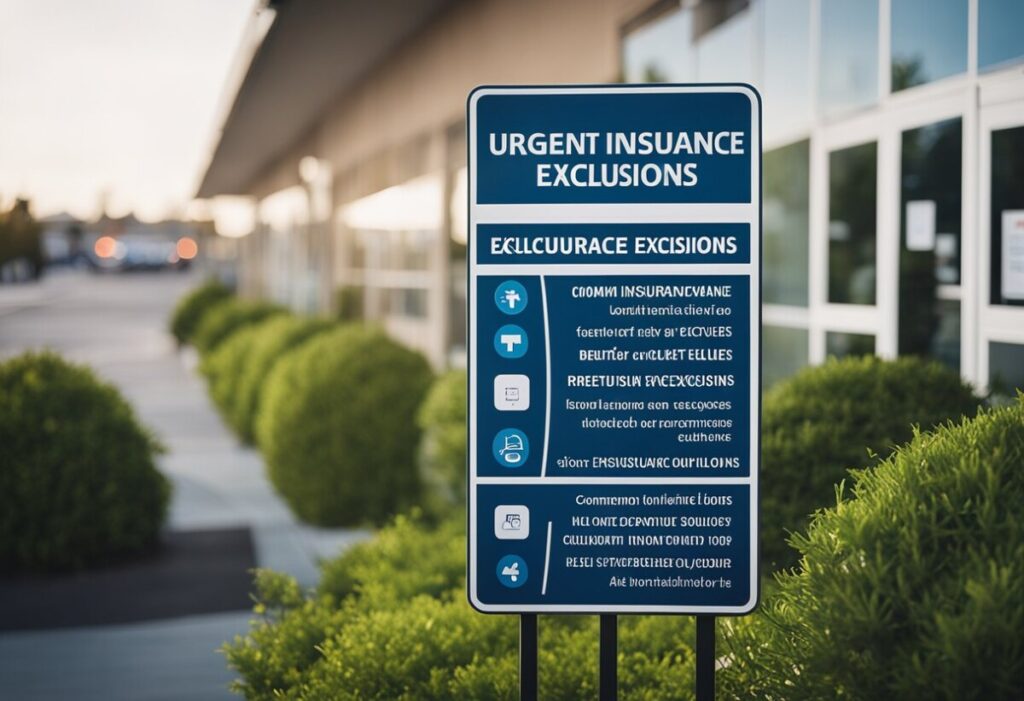Urgent care facilities are becoming increasingly popular in the United States due to their convenience and accessibility. However, many people are unsure if their insurance covers urgent care visits. The answer to this question is not straightforward, as it depends on the individual’s insurance plan and the specific urgent care facility they visit.
Table of Contents

Some insurance plans do cover urgent care visits, while others do not. It is important for individuals to check with their insurance provider to determine their coverage. Even if urgent care is covered, there may be certain limitations or restrictions, such as a higher copay or deductible. Additionally, some urgent care facilities may not be in-network with a person’s insurance plan, which could result in higher out-of-pocket costs.
Understanding Urgent Care Insurance Coverage
Urgent care is a type of medical service that provides immediate treatment for non-life-threatening illnesses and injuries. It is a convenient option for those who cannot wait for an appointment with their primary care physician or when an emergency room visit is not necessary.
Many insurance plans cover urgent care services, but the extent of coverage may vary depending on the plan. Some plans may require a copay or deductible, while others may cover the full cost of the visit. It is important to check with your insurance provider to understand your coverage and any out-of-pocket expenses you may be responsible for.
In addition to coverage for the visit itself, some insurance plans may also cover the cost of any necessary tests or procedures performed during the visit. However, it is important to note that not all services may be covered, such as elective procedures or cosmetic treatments.
It is also important to remember that urgent care centers are not a substitute for emergency rooms. If you are experiencing a life-threatening emergency, such as chest pain or difficulty breathing, it is important to call 911 or go to the nearest emergency room immediately.
Overall, understanding your insurance coverage for urgent care can help you make informed decisions about your medical care and avoid unexpected expenses.
Types of Insurance Plans and Urgent Care Coverage

HMO Plans
Health Maintenance Organization (HMO) plans typically require patients to see healthcare providers within a specific network. HMOs usually require a primary care physician (PCP) to provide referrals to specialists. Urgent care visits are generally covered under HMO plans, but patients may be required to receive care from a specific urgent care center within their network.
PPO Plans
Preferred Provider Organization (PPO) plans offer more flexibility than HMO plans. Patients can see healthcare providers outside of their network, but they may have to pay higher out-of-pocket costs. Urgent care visits are typically covered under PPO plans, but patients may be required to pay a copay or coinsurance.
POS Plans
Point of Service (POS) plans combine features of HMO and PPO plans. Patients usually have a PCP and must receive referrals for specialist care. Urgent care visits are generally covered under POS plans, but patients may be required to pay a copay or coinsurance.
EPO Plans
Exclusive Provider Organization (EPO) plans are similar to HMO plans in that patients must see healthcare providers within a specific network. However, EPO plans do not require patients to choose a PCP or obtain referrals for specialist care. Urgent care visits are typically covered under EPO plans, but patients may be required to receive care from a specific urgent care center within their network.
Medicare and Medicaid
Medicare and Medicaid are government-funded insurance programs for individuals who meet certain eligibility requirements. Urgent care visits are generally covered under both Medicare and Medicaid, but patients may be required to pay a copay or coinsurance. Medicaid coverage for urgent care may vary by state.
In-Network vs Out-of-Network Urgent Care Services
When it comes to urgent care services, insurance coverage can be a bit confusing. In general, most insurance plans cover urgent care visits, but the amount of coverage can vary depending on whether the urgent care provider is in-network or out-of-network.
In-network urgent care providers have agreements with insurance companies to provide care at a discounted rate. This means that if you visit an in-network urgent care center, you will likely pay less out of pocket than if you visit an out-of-network provider. In addition, your insurance plan may cover a larger portion of the cost of an in-network visit.
On the other hand, out-of-network urgent care providers do not have agreements with insurance companies. This means that if you visit an out-of-network provider, you may be responsible for a larger portion of the cost of the visit. In some cases, your insurance plan may not cover out-of-network urgent care visits at all.
It’s important to note that even if you visit an in-network urgent care provider, you may still be responsible for a copay or deductible. These costs can vary depending on your insurance plan and the specific urgent care provider you visit.
To ensure that you are getting the most coverage for your urgent care visit, it’s important to check with your insurance company to see which providers are in-network and what your coverage will be. Many insurance companies have online tools or customer service representatives who can help you find an in-network provider and understand your coverage options.
Cost Considerations for Urgent Care with Insurance

When considering seeking medical attention at an urgent care facility, it is important to understand the potential costs and how they may be covered by insurance. Here are some cost considerations to keep in mind when visiting urgent care with insurance.
Co-Payments
Many insurance plans require a co-payment for urgent care visits. This is a set amount that the patient is responsible for paying at the time of the visit. Co-payments for urgent care visits may be lower than those for emergency room visits, but they can still vary depending on the insurance plan.
Deductibles
Deductibles are the amount of money that the patient must pay out of pocket before their insurance coverage begins. Urgent care visits may be subject to the deductible, meaning that the patient is responsible for paying the full cost of the visit until their deductible is met.
Co-Insurance
Co-insurance is the percentage of the cost of the visit that the patient is responsible for paying after the deductible has been met. This can vary depending on the insurance plan, but typically ranges from 10% to 50%. It is important to check with the insurance provider to understand the co-insurance requirements for urgent care visits.
Out-of-Pocket Maximums
Out-of-pocket maximums are the maximum amount of money that the patient is responsible for paying in a given year. Once this amount is reached, the insurance plan covers the remaining costs for covered services. Urgent care visits may be subject to the out-of-pocket maximum, so it is important to understand this amount when considering the potential costs of a visit.
Overall, understanding the potential costs and coverage for urgent care visits with insurance can help patients make informed decisions about their medical care. It is important to check with the insurance provider to understand the specific requirements of their plan.
Common Insurance Policy Exclusions for Urgent Care

Although many insurance plans do cover urgent care visits, there are some common exclusions to be aware of. Here are a few:
- Out-of-network providers: If you visit an urgent care center that is not in your insurance plan’s network, you may be responsible for paying the full cost of the visit.
- Non-urgent care: Some insurance plans may not cover visits to urgent care centers for non-urgent medical issues, such as routine physicals or vaccinations.
- Referral requirements: Some insurance plans may require a referral from a primary care physician before covering urgent care visits.
- High deductibles or copays: Even if your insurance plan covers urgent care visits, you may still be responsible for a high deductible or copay.
It is important to check with your insurance provider to understand what is covered and what is not when it comes to urgent care visits. This can help you avoid unexpected costs and ensure that you receive the care you need.
How to Verify Urgent Care Coverage
When seeking urgent care, it is important to verify whether your insurance policy covers the services offered by the urgent care facility. Here are a few steps to help you verify your urgent care coverage:
- Check Your Insurance Policy: The first step in verifying your coverage is to check your insurance policy. Review your policy documents or contact your insurance provider to determine if urgent care services are covered under your plan.
- In-Network Providers: If your insurance policy covers urgent care, ensure that the facility you plan to visit is an in-network provider. Visiting an out-of-network provider may result in higher out-of-pocket expenses.
- Co-payments and Deductibles: It is important to understand your co-payment and deductible requirements for urgent care services. Some insurance policies may require a co-payment for each visit, while others may require a deductible to be met before coverage kicks in.
- Pre-Authorization: Some insurance policies may require pre-authorization before receiving urgent care services. Contact your insurance provider to determine if pre-authorization is required and to obtain the necessary approval.
- Billing: After receiving urgent care services, ensure that the facility bills your insurance provider correctly. Review your insurance policy to ensure that the services received are covered and that you are not responsible for any additional expenses.
By following these steps, you can verify your urgent care coverage and avoid unexpected expenses.
Navigating Urgent Care Without Insurance
If you don’t have insurance, navigating the world of urgent care can be daunting. However, there are options available to help you receive the care you need without breaking the bank.
Payment Plans
Many urgent care centers offer payment plans for patients without insurance. These plans typically involve setting up a payment schedule for the cost of services received. It’s important to discuss payment options with the urgent care center before receiving any treatment to ensure you understand the costs and payment plan options available.
Community Health Clinics
Community health clinics are another option for those without insurance. These clinics offer a range of services, including urgent care, at a lower cost than traditional urgent care centers. They may also offer sliding scale fees based on income, making care even more affordable.
Urgent Care Membership Programs
Some urgent care centers offer membership programs for patients without insurance. These programs typically involve paying a monthly or annual fee in exchange for discounted services. While the upfront cost may seem daunting, it can ultimately save you money in the long run if you require frequent urgent care visits.
Regardless of which option you choose, it’s important to prioritize your health and seek care when necessary. Don’t let the lack of insurance prevent you from receiving the care you need.
FAQs in Urgent Care Insurance Coverage
When it comes to urgent care, many people wonder if their insurance will cover the cost of their visit. Here are some frequently asked questions about insurance coverage for urgent care:
- What types of insurance typically cover urgent care? Most health insurance plans cover urgent care visits, including private insurance, Medicare, and Medicaid. However, it’s always a good idea to check with your insurance provider to confirm coverage and any potential out-of-pocket costs.
- What if I don’t have insurance? If you don’t have insurance, you can still receive urgent care services, but you will be responsible for paying the full cost of the visit. Some urgent care centers offer discounted rates for uninsured patients, so it’s worth asking about this option.
- Will I need to pay a copay or deductible for urgent care? This depends on your insurance plan. Some plans require a copay for urgent care visits, while others may apply the cost of the visit to your deductible. Again, it’s best to check with your insurance provider to understand your coverage and any potential costs.
- What if I need additional testing or treatment beyond my urgent care visit? If you require additional testing or treatment, such as lab work or imaging, your insurance may cover these costs if they are deemed medically necessary. However, it’s important to note that some tests or treatments may not be covered by your insurance, so it’s always a good idea to check with your provider.
Overall, urgent care visits are typically covered by insurance, but it’s important to understand your specific coverage and any potential costs. If you have any questions or concerns about your insurance coverage for urgent care, don’t hesitate to reach out to your insurance provider for more information.

